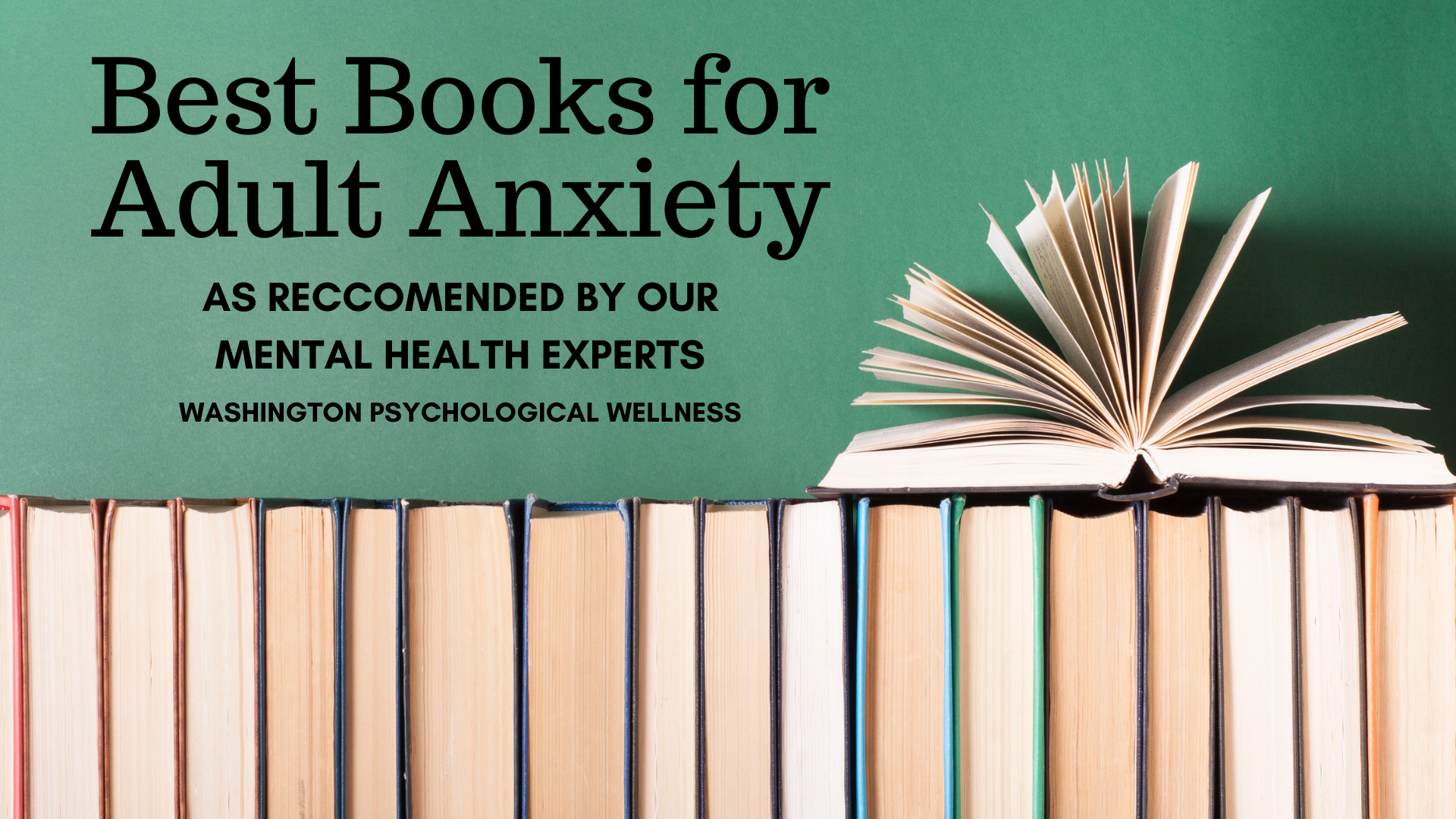
12 Best Books for Anxiety for Adults
At Washington Psychological Wellness, a psychotherapy center in Gaithersburg, MD, we get asked the question all the time. What are the best books for anxiety? Well, we asked our mental health clinicians and put together this list of recommended readings!
Want more recommended mental health book options? Check out our Books We Love section to discover a list of hand-picked resources!
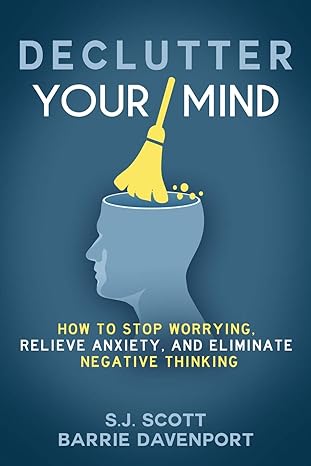
Declutter Your Mind: How to Stop Worrying, Relieve Anxiety, and Eliminate Negative Thinking
by S.J. Scott and Barrie Davenport
Best Books for Adult Anxiety
Summary
In Declutter Your Mind, authors S.J. Scott and Barrie Davenport delve deep into the concept of mental clutter—those incessant thoughts that crowd our minds, leading to anxiety and stress. The book is structured to help readers systematically identify and eliminate this clutter. It begins by exploring the nature of negative thinking, explaining how certain thought patterns, often rooted in fear and worry, can dominate our mental space and drain our emotional energy.
Scott and Davenport introduce readers to mindfulness practices designed to bring awareness to these thoughts and gently let them go. Through exercises like meditation, journaling, and breathing techniques, they guide readers toward a more focused, intentional way of living. The book also emphasizes the importance of setting clear priorities, learning to say no, and simplifying daily routines—all of which contribute to a calmer, more centered mind.
What sets this book apart is its practicality. The authors provide actionable steps that can be easily incorporated into daily life, making it accessible to those who are new to mindfulness as well as those looking to deepen their practice. By the end of the book, readers will have a clear roadmap to decluttering their minds and creating space for peace and clarity.
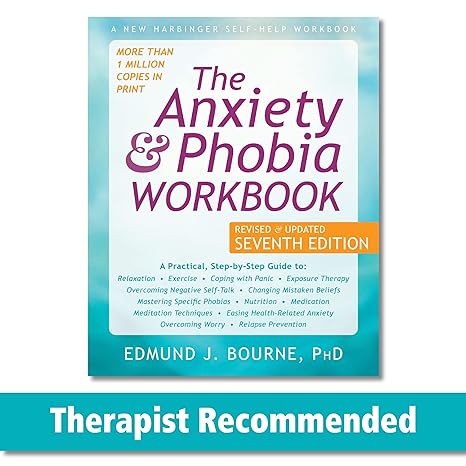
The Anxiety and Phobia Workbook
by Edmund J. Bourne, PhD
Best Books for Adult Anxiety
Summary
Dr. Edmund J. Bourne’s The Anxiety and Phobia Workbook is a comprehensive resource that has been a trusted guide for millions of people dealing with anxiety disorders. This workbook is particularly effective because it combines cognitive-behavioral therapy (CBT) techniques, which are widely regarded as the gold standard in anxiety treatment, with a variety of other therapeutic approaches, including relaxation techniques, mindfulness, and exposure therapy.
The book begins by helping readers understand the nature of anxiety and phobias, offering detailed explanations of how these conditions develop and how they are maintained. Dr. Bourne then introduces a variety of exercises designed to challenge and change the negative thought patterns that contribute to anxiety. These exercises are laid out in a step-by-step format, making them easy to follow and implement.
One of the strengths of this workbook is its holistic approach. Dr. Bourne not only addresses the psychological aspects of anxiety but also includes strategies for managing the physical symptoms, such as rapid heartbeat and shortness of breath. The relaxation techniques presented—such as progressive muscle relaxation, deep breathing, and guided imagery—are designed to help calm the body’s stress response and promote a sense of well-being.
The workbook also includes chapters on dealing with specific types of anxiety, such as social anxiety, panic disorder, and generalized anxiety disorder (GAD). Each chapter is filled with practical advice and exercises tailored to address the unique challenges of each condition. Whether you’re dealing with mild anxiety or severe phobias, this workbook offers tools that can help you regain control of your life.
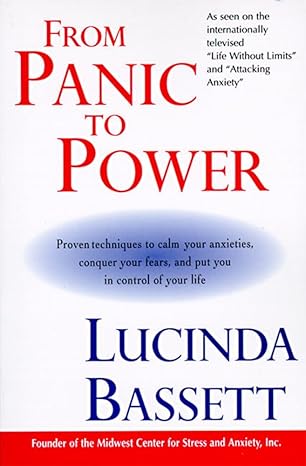
From Panic to Power: Proven Techniques to Calm Your Anxieties, Conquer Your Fears, and Put You in Control of Your Life
by Lucinda Bassett
Best Books for Adult Anxiety
Summary
From Panic to Power is both a personal memoir and a self-help guide, offering readers a unique blend of inspiration and practical advice. Lucinda Bassett, who struggled with severe anxiety and panic attacks herself, shares her journey of overcoming these challenges and transforming her life. Her story is one of resilience and empowerment, making this book not only informative but also deeply motivating.
Bassett’s approach to managing anxiety is rooted in her own experiences and the methods she developed to conquer her fears. She introduces readers to techniques that helped her shift from a state of constant fear to one of confidence and control. The book covers a wide range of topics, from understanding the root causes of panic attacks to developing coping strategies that can be used in moments of high anxiety.
One of the key techniques Bassett emphasizes is the power of positive thinking. She explains how our thoughts can either fuel anxiety or help to diminish it, and she provides exercises designed to help readers reframe their thinking patterns. These exercises are complemented by relaxation techniques, such as deep breathing and visualization, which help to calm the mind and body.
Bassett also addresses the importance of self-care and lifestyle changes in managing anxiety. She discusses the role of diet, exercise, and sleep in maintaining mental health and offers practical tips for incorporating these elements into daily life. By the end of the book, readers will have a comprehensive toolkit of strategies for managing anxiety and living a more fulfilling, empowered life.
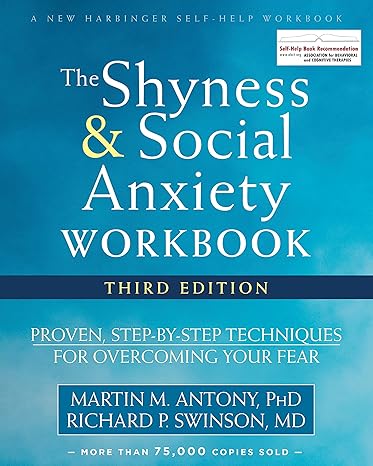
The Shyness and Social Anxiety Workbook: Proven, Step-by-Step Techniques for Overcoming Your Fear
by Martin M. Antony, PhD, and Richard P. Swinson, MD
Best Books for Adult Anxiety
Summary
Social anxiety can be an overwhelming challenge, affecting everything from personal relationships to professional success. The Shyness and Social Anxiety Workbook by Dr. Martin M. Antony and Dr. Richard P. Swinson offers a structured, evidence-based approach to overcoming this common but often debilitating condition. The authors, both experts in the field of anxiety disorders, draw on decades of clinical experience to provide readers with a comprehensive set of tools for managing social anxiety.
The workbook is designed to be interactive, with exercises that encourage readers to actively engage with the material and apply what they’ve learned to their own lives. The authors begin by helping readers identify the specific thoughts and behaviors that contribute to their social anxiety. They then introduce cognitive-behavioral techniques to challenge and change these thoughts, reducing the fear and avoidance that often accompany social situations.
One of the standout features of this workbook is its focus on gradual exposure. Dr. Antony and Dr. Swinson guide readers through a step-by-step process of facing their fears in a controlled and systematic way. This process is designed to build confidence and reduce anxiety over time, making social situations less daunting and more manageable.
The workbook also includes chapters on building social skills, such as assertiveness and communication, which are often areas of difficulty for those with social anxiety. By improving these skills, readers can feel more confident and competent in social interactions, further reducing their anxiety.
In addition to the cognitive-behavioral techniques, the authors also incorporate mindfulness exercises, which help readers stay present and focused during social interactions, rather than getting caught up in anxious thoughts. This combination of approaches makes The Shyness and Social Anxiety Workbook a valuable resource for anyone looking to overcome social anxiety and lead a more connected, fulfilling life.
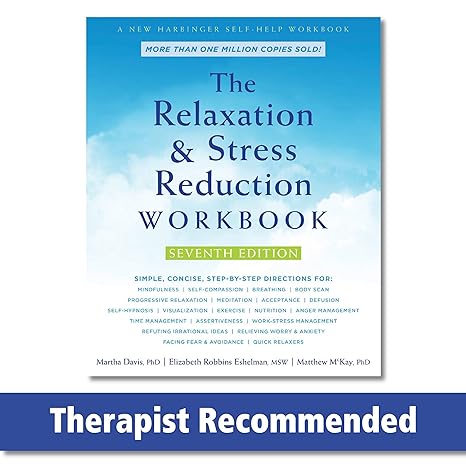
The Relaxation and Stress Reduction Workbook
by Martha Davis, PhD, Elizabeth Robbins Eshelman, MSW, and Matthew McKay, PhD
Best Books for Adult Anxiety
Summary
Stress and anxiety are closely linked, and The Relaxation and Stress Reduction Workbook provides a wealth of techniques for managing both. This classic resource, now in its seventh edition, has been helping people reduce stress and anxiety for over three decades. The authors, all experts in the field of psychology, offer a wide range of relaxation techniques that can be tailored to fit each individual’s needs.
The workbook is divided into sections, each focusing on a different relaxation technique. These include deep breathing, progressive muscle relaxation, guided imagery, and mindfulness meditation. Each technique is explained in detail, with step-by-step instructions that make it easy to practice on your own. The authors also provide suggestions for integrating these techniques into your daily routine, making relaxation a regular part of your life.
In addition to relaxation techniques, the workbook also covers stress management strategies. The authors explore the various sources of stress in our lives, from work and relationships to health and finances, and offer practical advice for managing these stressors. They emphasize the importance of healthy coping mechanisms, such as time management, problem-solving, and assertiveness, which can help reduce the impact of stress on your life.
One of the key strengths of this workbook is its flexibility. Readers can choose the techniques that resonate most with them and create a personalized relaxation plan. The book also includes self-assessment tools that help you track your progress and adjust your plan as needed. Whether you’re dealing with chronic stress or occasional anxiety, The Relaxation and Stress Reduction Workbook offers valuable tools for achieving a calmer, more balanced life.
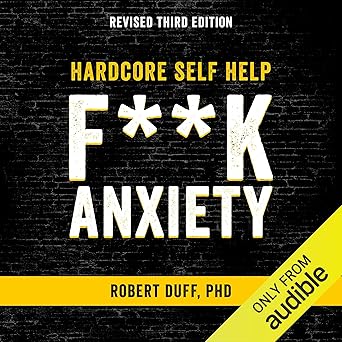
Hardcore Self Help: F–k Anxiety
by Robert Duff
Best Books for Adult Anxiety
Summary
Robert Duff’s Hardcore Self Help: F–k Anxiety is a breath of fresh air in the world of self-help literature. Written in a conversational, no-nonsense style, this book is perfect for those who are tired of the typical clinical approach to anxiety management. Duff, a psychologist, cuts through the jargon and gets straight to the point, offering readers practical advice that is both relatable and effective.
What sets this book apart is its tone. Duff speaks directly to the reader, using humor and straightforward language to make complex psychological concepts easy to understand. He acknowledges that dealing with anxiety can be frustrating and exhausting, and he offers a compassionate but firm approach to tackling it head-on.
The book is divided into two main sections. The first section focuses on understanding anxiety, exploring the various ways it manifests and how it affects both the mind and body. Duff explains the role of the brain in anxiety, offering insights into how our thought patterns and behaviors can either exacerbate or alleviate anxious feelings.
The second section of the book is all about action. Duff provides a range of practical strategies for managing anxiety, including mindfulness exercises, cognitive-behavioral techniques, and lifestyle changes. He encourages readers to experiment with different approaches and find what works best for them. The book also includes exercises that can be done on the go, making it a handy resource for those who need quick relief from anxiety.
Overall, Hardcore Self Help: F–k Anxiety is an empowering and accessible guide for anyone looking to take control of their anxiety. Its informal tone and practical advice make it a great choice for those who want to tackle anxiety without getting bogged down in technical details.
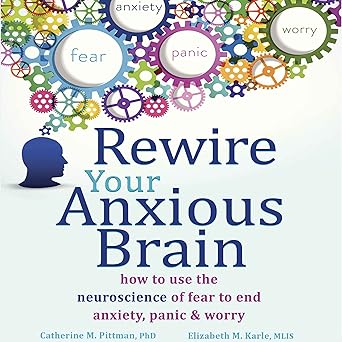
Rewire Your Anxious Brain: How to Use the Neuroscience of Fear to End Anxiety, Panic, and Worry
by Catherine M. Pittman, PhD, and Elizabeth M. Karle, MLIS
Best Books for Adult Anxiety
Summary
Rewire Your Anxious Brain offers a deep dive into the neuroscience of anxiety, providing readers with a clear understanding of how the brain contributes to anxious thoughts and behaviors. Dr. Catherine M. Pittman, a clinical psychologist, and Elizabeth M. Karle, a librarian, combine their expertise to create a book that is both scientifically grounded and accessible to the general reader.
The book is centered around the concept of “rewiring” the brain to reduce anxiety. Pittman and Karle explain that anxiety is rooted in two key areas of the brain: the amygdala, which triggers the fear response, and the cortex, which processes thoughts and can either amplify or diminish anxiety. By understanding how these brain regions work, readers can learn to intervene in the anxiety process and reduce its impact.
One of the book’s strengths is its focus on practical strategies for changing the brain’s response to anxiety. The authors introduce a variety of techniques, including mindfulness, cognitive restructuring, and gradual exposure, which are designed to “rewire” the brain over time. These techniques are supported by the latest research in neuroscience, making them both effective and evidence-based.
Pittman and Karle also address the role of emotions in anxiety, offering insights into how emotional regulation can help reduce anxiety symptoms. They provide exercises that help readers identify and manage their emotions, which can prevent anxiety from escalating into panic or chronic worry.
The book is filled with real-life examples and case studies, which illustrate how the techniques can be applied in everyday situations. Whether you’re dealing with general anxiety, panic attacks, or specific phobias, Rewire Your Anxious Brain offers valuable tools for managing your symptoms and creating lasting change.
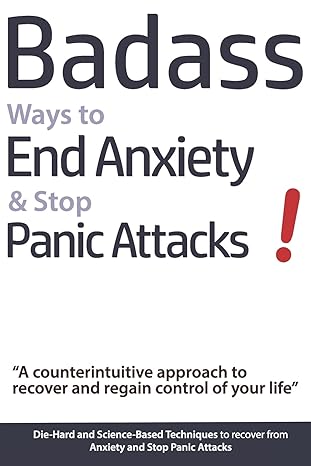
Badass Ways to End Anxiety & Stop Panic Attacks! – A Counterintuitive Approach to Recover and Regain Control of Your Life
by Geert Verschaeve
Best Books for Adult Anxiety
Summary
Geert Verschaeve’s Badass Ways to End Anxiety & Stop Panic Attacks! takes a bold and unconventional approach to anxiety management. Unlike many self-help books that focus on avoiding or minimizing anxiety, Verschaeve encourages readers to confront their fears head-on. His approach is rooted in the idea that facing anxiety directly, rather than running from it, is the key to overcoming it.
The book is divided into several sections, each of which addresses a different aspect of anxiety and panic attacks. Verschaeve begins by debunking common myths about anxiety, such as the idea that it is something to be feared or avoided at all costs. He explains that anxiety is a natural response to perceived threats, and that by understanding and accepting it, we can begin to reduce its power over us.
One of the book’s core messages is that anxiety is not the enemy. Verschaeve argues that trying to eliminate anxiety entirely can actually make it worse, as this approach often leads to increased fear and avoidance behaviors. Instead, he advocates for a mindset of acceptance and curiosity, encouraging readers to explore their anxiety and learn from it.
The book also includes a variety of exercises and techniques designed to help readers take control of their anxiety. These include mindfulness practices, exposure therapy, and cognitive-behavioral techniques, all of which are presented in a straightforward and accessible manner. Verschaeve’s approach is unapologetically direct, and he challenges readers to push beyond their comfort zones in order to achieve lasting change.
Overall, Badass Ways to End Anxiety & Stop Panic Attacks! is a powerful and empowering guide for anyone who is ready to take a bold approach to anxiety management. Its counterintuitive methods may be challenging, but they offer a path to true freedom from anxiety.
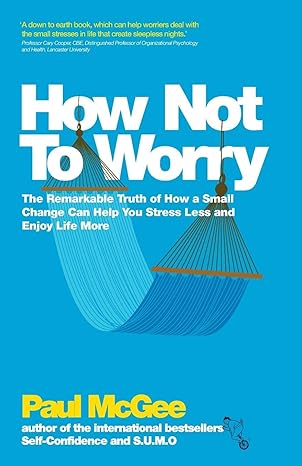
How Not To Worry: The Remarkable Truth of How a Small Change Can Help You Stress Less and Enjoy Life More
by Paul McGee
Best Books for Adult Anxiety
Summary
In How Not To Worry, Paul McGee offers a refreshing perspective on anxiety and worry, emphasizing the power of small changes to make a big difference in your mental well-being. McGee, an experienced motivational speaker and author, combines humor, wisdom, and practical advice to help readers break free from the cycle of worry and live a more fulfilling life.
The book is built around the idea that worry is a natural part of life, but it doesn’t have to control us. McGee explores the nature of worry, explaining how it often stems from a desire to control the uncontrollable. He argues that by letting go of the need for control and focusing on what we can influence, we can significantly reduce our anxiety levels.
One of the book’s key concepts is the “C.A.N.T. Principle,” which stands for Control, Acceptance, Now, and Think. McGee uses this principle to guide readers through the process of managing worry. He explains how to identify what you can control, accept what you can’t, focus on the present moment, and think positively about the future. This simple yet powerful framework provides a practical approach to reducing worry and anxiety.
McGee also addresses the role of perspective in managing worry. He encourages readers to take a step back and consider their worries in the broader context of their lives. By doing so, they can often see that their fears are not as overwhelming as they seem. The book is filled with real-life examples and anecdotes that illustrate how small shifts in perspective can lead to big changes in how we experience anxiety.
In addition to the mental strategies, McGee offers practical tips for managing stress, such as improving time management, setting realistic goals, and taking care of your physical health. He emphasizes the importance of self-compassion and encourages readers to be kind to themselves as they work through their worries.
How Not To Worry is a lighthearted yet deeply insightful book that offers a balanced approach to managing anxiety. McGee’s conversational style and practical advice make it an enjoyable and accessible read for anyone looking to stress less and enjoy life more.
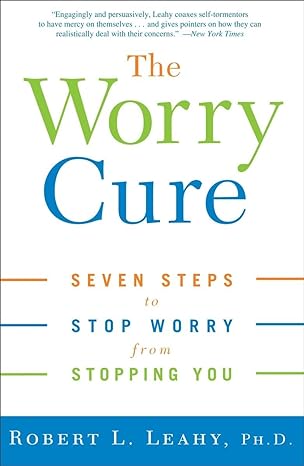
The Worry Cure: Seven Steps to Stop Worry from Stopping You
by Robert L. Leahy
Best Books for Adult Anxiety
Summary
The Worry Cure by Dr. Robert L. Leahy is a comprehensive guide to understanding and overcoming chronic worry. Dr. Leahy, a leading expert in cognitive-behavioral therapy, offers a seven-step program that is designed to help readers break free from the cycle of worry and regain control of their lives.
The book begins by exploring the nature of worry, explaining how it differs from healthy problem-solving and how it can become a chronic and debilitating habit. Dr. Leahy delves into the psychological mechanisms that drive worry, such as catastrophic thinking and intolerance of uncertainty, and provides insights into why some people are more prone to worry than others.
One of the strengths of The Worry Cure is its focus on practical, actionable strategies. Dr. Leahy’s seven-step program is based on cognitive-behavioral techniques that have been proven to be effective in reducing worry. These steps include identifying and challenging negative thoughts, learning to tolerate uncertainty, and developing a more balanced perspective on life’s challenges.
Dr. Leahy also addresses the role of emotions in worry, explaining how anxiety, guilt, and other negative emotions can fuel the worry cycle. He provides exercises that help readers become more aware of their emotional responses and develop healthier ways of coping with them. These exercises are designed to be simple and easy to implement, making them accessible to readers at all levels of experience with anxiety management.
The book also includes chapters on specific types of worry, such as health anxiety, relationship worries, and work-related stress. Dr. Leahy offers tailored advice for managing these common concerns, helping readers apply the seven-step program to their unique situations.
Throughout the book, Dr. Leahy emphasizes the importance of self-compassion and acceptance. He encourages readers to be patient with themselves as they work through their worries and to recognize that progress may take time. The Worry Cure is a compassionate and empowering guide that offers hope and practical tools for anyone struggling with chronic worry.
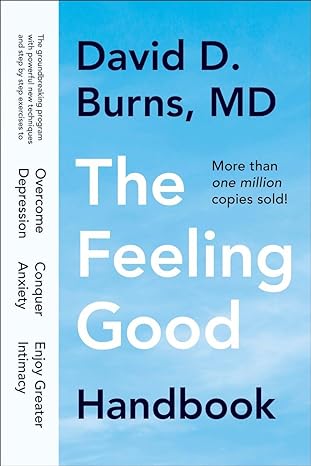
The Feeling Good Handbook
by David D. Burns
Best Books for Adult Anxiety
Summary
Dr. David D. Burns’ The Feeling Good Handbook is a classic in the field of cognitive-behavioral therapy, offering readers a wealth of tools and exercises to help manage anxiety, depression, and other negative emotions. Dr. Burns, a pioneer in the development of CBT, presents his techniques in a clear and accessible manner, making this book a valuable resource for both newcomers to therapy and those with more experience.
The book is divided into several sections, each focusing on a different aspect of emotional well-being. Dr. Burns begins by explaining the principles of cognitive-behavioral therapy, emphasizing the connection between our thoughts, feelings, and behaviors. He introduces readers to the concept of cognitive distortions, or irrational thought patterns, and provides exercises for identifying and challenging these distortions.
One of the key features of The Feeling Good Handbook is its focus on self-help. Dr. Burns offers a variety of exercises that can be done independently, allowing readers to take an active role in their own emotional healing. These exercises include thought records, where readers can track their negative thoughts and work to reframe them, as well as behavioral experiments, which encourage readers to test out new ways of thinking and behaving.
In addition to cognitive-behavioral techniques, Dr. Burns also addresses the role of lifestyle factors in emotional well-being. He provides practical advice on topics such as diet, exercise, sleep, and stress management, all of which can have a significant impact on anxiety levels. He also includes chapters on improving relationships, increasing self-esteem, and overcoming procrastination, making this book a comprehensive guide to overall mental health.
The book is filled with case studies and real-life examples, which help to illustrate the techniques and make them more relatable. Dr. Burns’ compassionate and encouraging tone makes the material approachable, even for those who may be new to therapy.
The Feeling Good Handbook is widely regarded as one of the most effective self-help books for anxiety and depression, and for good reason. Its combination of cognitive-behavioral techniques, practical advice, and compassionate guidance makes it an invaluable resource for anyone looking to improve their mental health.
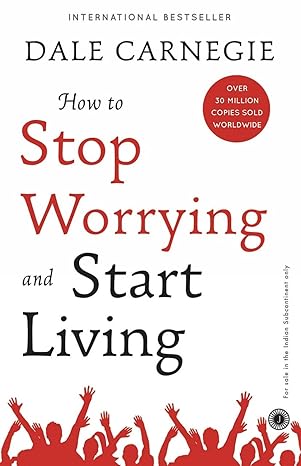
How to Stop Worrying and Start Living
by Dale Carnegie
Best Books for Adult Anxiety
Summary
Dale Carnegie’s How to Stop Worrying and Start Living is a timeless classic that has helped millions of people reduce their anxiety and live more fulfilling lives. First published in 1948, the book offers practical advice that remains relevant today, making it a must-read for anyone struggling with chronic worry.
The book is based on Carnegie’s own experiences and observations, as well as the insights he gained from interviewing hundreds of people who successfully overcame their worries. Carnegie’s approach is rooted in common sense and practicality, and he presents his ideas in a straightforward, easy-to-understand manner.
The book is divided into several sections, each focusing on a different aspect of worry. Carnegie begins by exploring the nature of worry, explaining how it can take a toll on our physical and mental health. He then offers a variety of techniques for managing worry, such as focusing on the present moment, breaking tasks down into manageable steps, and cultivating a positive mindset.
One of the book’s key messages is the importance of acceptance. Carnegie encourages readers to accept the things they cannot change and to focus their energy on the things they can control. He also emphasizes the value of gratitude, suggesting that by appreciating what we have, we can reduce our worries and increase our overall happiness.
Carnegie includes numerous real-life examples and anecdotes throughout the book, which help to illustrate his points and make the material more engaging. He also offers practical exercises that readers can use to apply the techniques in their own lives.
How to Stop Worrying and Start Living is more than just a self-help book; it’s a guide to living a more fulfilling and worry-free life. Its timeless wisdom and practical advice make it an essential read for anyone looking to reduce anxiety and find greater peace of mind.
About Washington Psychological Wellness
At Washington Psychological Wellness, our therapists have extensive training, experience, and insights to treat a wide variety of anxiety disorders. Our therapists specialize in helping clients manage general anxiety, social anxiety, panic disorders, and other anxiety-related conditions. We understand that anxiety can significantly impact your daily life, relationships, and overall well-being.
Anxiety treatment at Washington Psychological Wellness often includes learning stress management techniques, coping strategies, and ways to reframe negative thought patterns. Our treatment modalities, such as cognitive-behavioral therapy (CBT), dialectical behavior therapy (DBT), and mindfulness-based therapy, are tailored to meet your unique needs and help you regain control over your life.
Ready to seek anxiety counseling?
Contact us now to schedule your complimentary 15-minute initial consultation. Telehealth (online) therapy options are available.
